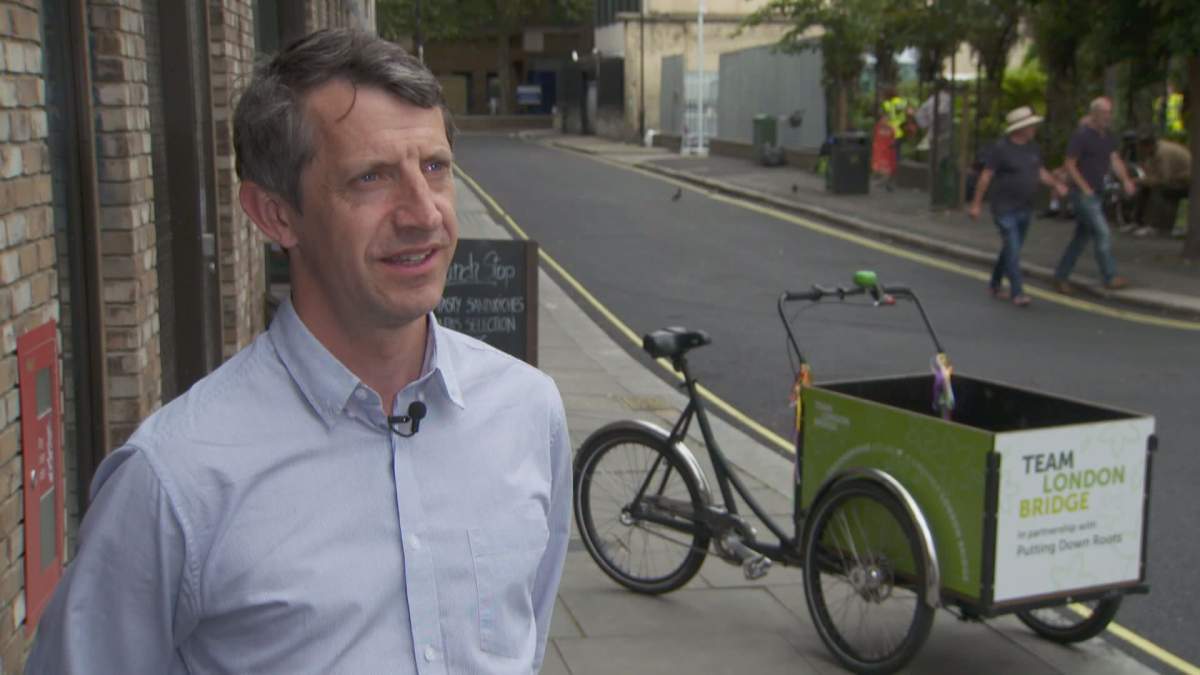More businesses in London, England are using cargo bikes for deliveries as it becomes prohibitively expensive to operate gasoline- or diesel-powered vehicles in the central part of the city.

Driving an older, more polluting car or van in the heart of the British capital can set non-resident drivers back around $39 a day in city charges, which are aimed at reducing emissions and congestion.
The fee can be as high as $178 for buses and trucks.
In April, London set up its Ultra Low Emissions Zone (ULEZ) to help reduce the high levels of vehicle pollution recorded on its streets.
The ULEZ covers 21 square kilometres, but will expand significantly in the fall of 2021, when London residents will also lose their exemption from the charges.
Team London Bridge is a business improvement area on the south side of the River Thames.
It has been providing businesses with small subsidies to switch their delivery services to cargo bikes, along with information on how they can do so.
“Now we have ULEZ, which is the Ultra Low Emission Zone, and we have to start responding to that and thinking about how can we develop the transport system for the future,” said Jack Skillen, placeshaping director with Team London Bridge.
Skillen said that once businesses realize that cargo bikes can carry relatively large loads, they’re happier to jump in the saddle.

Get weekly health news
“Most of central London is covered. I heard about a cargo bike recently carrying a sofa up Hampstead Hill. So they do big, big deliveries,” said Skillen.
“Huge, bulky deliveries can be taken quite a distance, because these cargo bags are often electric-powered — so it’s…pedal-assisted, so they’re pretty powerful.”
Medical deliveries
One of the businesses that recently switched from mopeds to cargo bikes is Viapath, a pathology service that transports blood and other patient samples between some London hospitals.
“It’s an hourly route between Guy’s Hospital and St. Thomas’s Hospital,” said Matt Newall, Head of Procurement & Supply Chain at Viapath.
“So it’s only a couple of miles, but I think with the technology that’s available — with the further technological advancements of cargo bikes, as well as hydrogen powered vehicles — we’re hoping to expand that to greater distances over the coming weeks and months.”
WATCH: (March 15, 2019) ‘It makes me feel good’: Bike ride program gets Penticton seniors outside enjoying nature

Newall said that because Viapth previously used mopeds on the route, they’re not avoiding any emissions charges by using cargo bikes.
In addition to that, he said cargo bikes are slightly more expensive to operate, but it makes sense from a corporate responsibility standpoint.
“Key to all of this, obviously, is to try and make this work commercially, and that’s the challenge that we continue to face,” said Newall.
“As we move towards the expansion of the Ultra Low Emission Zone, we’re already talking about a dozen different routes, working with our courier partner, where cargo bikes can be implemented fairly swiftly.”
Even with the ULEZ in place, London traffic can often be dire, and that’s when cargo bikes can make the most of the capital’s ever-expanding network of bike lanes.
“You’ll be surprised how fast you are,” said Johnny O’Flynn, a cargo bike courier with CitySprint.
“You can really travel across London very quickly, almost sometimes faster than a moped, and definitely a car, because you can weave in and out of traffic.”
CitySprint says it operates the largest push bike courier fleet in London.
WATCH: (July 12, 2019) Taking a pass on gas: Electric planes may be the future of air travel

Since 2017, the company has seen a 305 per cent increase in cargo bike bookings, and at least 55 per cent of its small van work in London is now being completed by cargo bikes.
Next month, Jack Skillen from Team London Bridge heads to Canada to speak about the initiative and plans for the future.
He will be addressing the National Association of City Transportation Officials (NACTO) — an organization of North American transit agencies — at its “Designing Cities 2019” event in Toronto.
“I think in a couple of years, you’ll see a very different London, where there will be cargo bikes that will be very visible,” said Skillen.
“And part of just the everyday life of, hopefully, a better city.”









Comments
Want to discuss? Please read our Commenting Policy first.